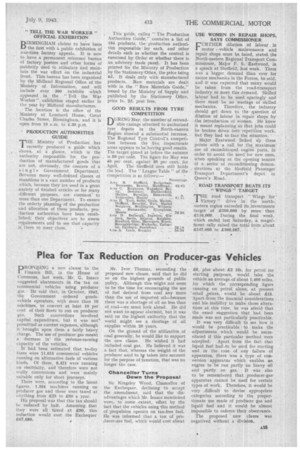Plea for Tax Reduction on Producer-gas Vehicles
Page 17

If you've noticed an error in this article please click here to report it so we can fix it.
PROPQ5DTG a new clause to the Finance Bill, in the House of Commons, last week, Mr. G. Isaacs suggested abatements in the tax on commercial vehicles using producer gas. He said that, in October, 1942, the Government ordered goodsvehicle operators, with more than 10 machines, to convert at least 10 per cent of their fleets to run on producer gas. Such conversions involved capital expenditure, but it was not permitted as current expenses, although it brought upon them a fairly heavy charge. The use of producer gas meant a decrease in' the revenue-earning capacity of the vehicles.
It had been estimated that to-day there were 11,615 commercial vehicles running on alternative fuels of various kinds. Of these, 6,421 were running on electricity, and therefore were not really conversions and were mainly suitable only for short journeys.
There were, according to the latest figures, 1,504 machines running on producer gas and these were taxed at A n v thing from £25 to £90 a year.
His proposal was that this tax should he reduced by half. Assuming that they were all taxed at £90, this redaction would cost the Exchequer £67,680. Mr. Ivor Thomas, seconding the proposed new clause, said that he did so on the highest grounds of public policy. Although this might not seem to be the time for encouraging the use of fuel derived from coal any more than the use of imported oil—because there was a shortage of oil no less than of coal—we must look ahead. He did not want to appear alarmist, but it was said on the highest authority that the world might see a shortage of oil supplies within 20 years.
On the ground of the utilization of coal generally, he would like to support the new clause. He wished it had included coal gas. He believed it was a fact that, whereas the weight of the producer used to bp taken into account for the purpose of taxation, that was no longer the case.
Chancellor Turns Down the Proposal
Sir Kingsley Wood, Chancellor of the Exchequer, declining to accept the amendment, said that the disadvantages which Mr. Isaacs mentioned were, to some extent, offset by the fact that the vehicles using this method of propulsion operate on tax-free fuel. He was informed that a ton of prbducer-uas fuel, which would cost about
£6, plus about £2 10s. for petrol for starting purposes, would take the vehicle an average of about 1;400 miles, for which the corresponding figure running on petrol alone, at present • retail ,prices, would be about £15. Apart 'from the financial considerations and his inability to make those alterations at this time, he was afraid that the exact suggestion that had been made was not particularly practicable.
It was very difficult to see how it would be practicable to make the adjustments which would be necessitated if this particular method were accepted. Apart from the fact that liquid fuel had.to be used for starting and in the case of any failure of apparatus, there was a type of conversion apparatus which enables an engine to be run partly on heavy oil and partly on gas. It was also to be remembered that producer-gas apparatus cannot be used for certain types of work. Therefore, it would be very difficult to devise appropriate categories according to the proportionate use made of producer gas and liquid fuel and it would, be almost impossible to enforce their observance,
The proposed new clause was negatived without a division.




















































